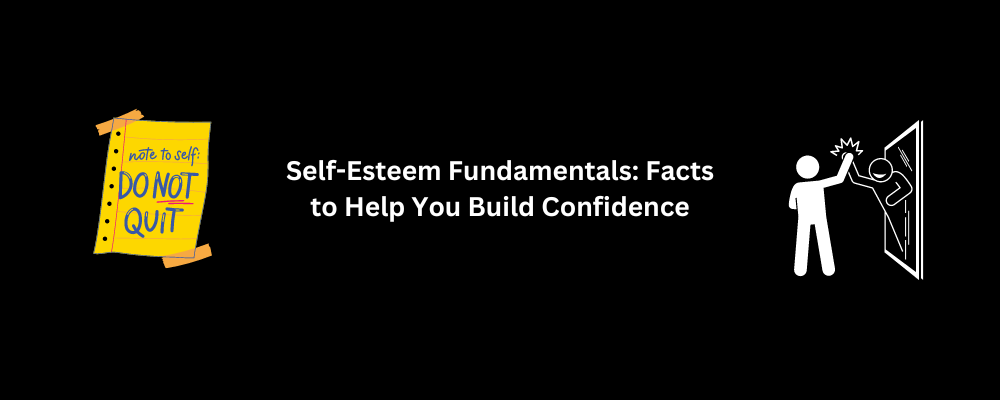Self-esteem is a fundamental aspect of our psychological well-being, influencing how we perceive ourselves and interact with the world. Understanding the basics of self-esteem and how to cultivate it can significantly enhance your confidence and overall life satisfaction. In this article, we will delve into the essentials of self-esteem, explore the factors that affect it, and provide practical tips to help you build and maintain a healthy level of self-confidence.
What is Self-Esteem?
Self-esteem refers to the overall sense of self-worth or personal value. It is the subjective evaluation of your own worth, encompassing beliefs about yourself (e.g., “I am capable,” “I am worthy”) as well as emotional states like triumph, despair, pride, and shame.
The Importance of Self-Esteem
A healthy level of self-esteem is crucial for mental and emotional well-being. It affects your relationships, career, and overall quality of life. People with high self-esteem tend to have more positive outlooks, are more resilient in the face of adversity, and are more likely to pursue their goals with confidence.
Factors Influencing Self-Esteem
Several factors contribute to the development of self-esteem, including:
1. Childhood Experiences
Early interactions with parents, teachers, and peers play a significant role in shaping self-esteem. Positive reinforcement, encouragement, and a supportive environment can foster high self-esteem, while criticism, neglect, or abuse can lead to low self-esteem.
2. Personal Achievements
Accomplishments and successes in various areas of life, such as academics, career, or personal projects, can boost self-esteem. The sense of competence and capability that comes from achieving goals reinforces a positive self-image.
3. Social Comparisons
Comparing yourself to others is a common but often detrimental behavior that can impact self-esteem. When you constantly measure yourself against others, it can lead to feelings of inadequacy and lower self-esteem, especially if the comparisons are unfavorable.
4. Body Image
How you perceive your physical appearance can significantly influence your self-esteem. Societal standards and media portrayals of beauty often create unrealistic expectations, leading to negative body image and lower self-esteem.
5. Relationships
The quality of your relationships with family, friends, and partners can affect your self-esteem. Supportive and affirming relationships can enhance self-worth, while toxic or abusive relationships can erode it.
Signs of Healthy vs. Low Self-Esteem
It’s essential to recognize the signs of both healthy and low self-esteem to better understand where you stand and what areas may need improvement.
Healthy Self-Esteem
- Confidence in one’s abilities
- Acceptance of both strengths and weaknesses
- Positive self-talk
- Willingness to take risks and try new things
- Ability to set and maintain healthy boundaries
Low Self-Esteem
- Persistent self-criticism
- Fear of failure and rejection
- Difficulty accepting compliments
- Social withdrawal or isolation
- Over-reliance on the approval of others
The Impact of Low Self-Esteem
Low self-esteem can have far-reaching effects on various aspects of life. It can hinder personal growth, strain relationships, and contribute to mental health issues such as anxiety and depression. People with low self-esteem may also struggle with decision-making, often doubting their capabilities and judgment.
How to Build and Improve Self-Esteem
Improving self-esteem is a journey that requires self-awareness, effort, and patience. Here are some practical strategies to help you build a stronger sense of self-worth:
1. Practice Self-Compassion
Treat yourself with the same kindness and understanding that you would offer to a friend. Acknowledge your mistakes and shortcomings without harsh self-judgment.
2. Set Realistic Goals
Break down your goals into manageable steps and celebrate small achievements along the way. This can help build a sense of accomplishment and boost your confidence.
3. Challenge Negative Thoughts
Identify and reframe negative self-talk. Replace thoughts like “I’m not good enough” with positive affirmations such as “I am capable and worthy.”
4. Surround Yourself with Positive Influences
Spend time with people who uplift and support you. Positive social interactions can reinforce your self-esteem and encourage personal growth.
5. Engage in Activities You Enjoy
Participating in hobbies or activities that you are passionate about can enhance your sense of fulfillment and self-worth.
6. Take Care of Your Physical Health
Regular exercise, a balanced diet, and sufficient sleep are essential for overall well-being and can positively influence your self-esteem.
7. Seek Professional Help if Needed
If low self-esteem is significantly impacting your life, consider seeking the help of a therapist or counselor. Professional support can provide valuable insights and strategies for improving self-esteem.
Building Self-Esteem in Children
Fostering self-esteem in children is crucial for their development and future well-being. Here are some ways to help children build confidence:
1. Encourage Independence
Allow children to make choices and take responsibility for their actions. This helps them develop a sense of competence and self-reliance.
2. Offer Praise and Recognition
Acknowledge their efforts and achievements, big or small. Positive reinforcement helps children feel valued and appreciated.
3. Model Healthy Self-Esteem
Children learn by observing the adults around them. Demonstrating healthy self-esteem and positive self-talk can influence their self-perception.
4. Provide a Safe and Supportive Environment
Create an environment where children feel safe to express themselves and explore new things. A nurturing environment fosters confidence and self-assurance.
The Role of Self-Esteem in Mental Health
Self-esteem plays a pivotal role in mental health. A healthy level of self-esteem is associated with lower levels of anxiety and depression, while low self-esteem is often linked to mental health challenges.
The Connection Between Self-Esteem and Anxiety
Low self-esteem can contribute to anxiety by fostering negative thoughts and fears of inadequacy. Conversely, anxiety can further diminish self-esteem, creating a cycle that is difficult to break.
Self-Esteem and Depression
People with low self-esteem are more susceptible to depression, as they may internalize negative experiences and engage in self-blame. Enhancing self-esteem can be a protective factor against depression.
The Journey to Lasting Confidence
Building lasting confidence is an ongoing process that requires dedication and self-reflection. It involves understanding your worth, embracing your uniqueness, and continuously working on personal growth.
1. Accept Yourself Unconditionally
Embrace who you are, including your flaws and imperfections. Self-acceptance is the foundation of lasting confidence.
2. Focus on Your Strengths
Identify and nurture your strengths and talents. Focusing on what you excel at can help reinforce your self-esteem and confidence.
3. Keep Learning and Growing
Continuously seek opportunities for personal development. Learning new skills and gaining knowledge can boost your confidence and open new doors in life.
4. Surround Yourself with Positivity
Cultivate relationships and environments that foster positivity and growth. Being around positive influences can uplift your spirits and enhance your confidence.
Conclusion
Self-esteem is a critical component of a fulfilling life, influencing everything from our relationships to our mental health. By understanding the factors that affect self-esteem and actively working to build and maintain it, you can enhance your confidence and overall well-being. Remember, the journey to healthy self-esteem is personal and ongoing, but the rewards of self-acceptance and confidence are well worth the effort.
FAQs
1. How can I boost my self-esteem quickly?
Start by practicing positive self-talk, setting small achievable goals, and celebrating your successes, no matter how minor.
2. Can self-esteem fluctuate over time?
Yes, self-esteem can change depending on life circumstances, experiences, and personal growth. It’s natural for it to fluctuate.
3. What is the difference between self-esteem and self-confidence?
Self-esteem refers to your overall sense of worth, while self-confidence is your belief in your abilities to succeed in specific situations.
4. How does social media affect self-esteem?
Social media can negatively impact self-esteem by fostering unrealistic comparisons and expectations. It’s important to use it mindfully.
5. Can therapy help with low self-esteem?
Yes, therapy can provide valuable tools and strategies to address and improve low self-esteem, helping you develop a healthier self-image.




